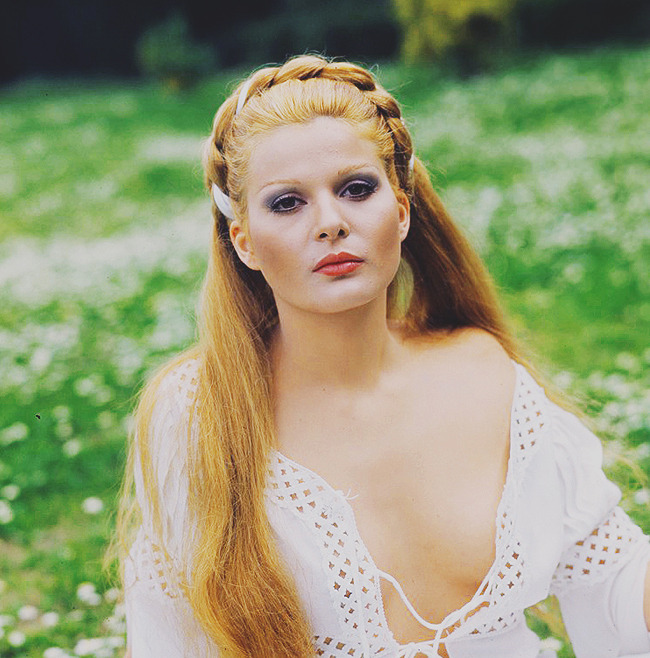In 1974, Simonetta Stefanelli stood at the precipice of global stardom. Her hauntingly beautiful portrayal of Apollonia Vitelli-Corleone in The Godfather (1972) had etched her into cinematic history. As the ill-fated Sicilian bride of Michael Corleone, Stefanelli’s screen presence—poised, delicate, and undeniably powerful—left a lasting impression on audiences worldwide. Yet at just 19 years old, and with the world seemingly at her feet, she made a decision that would define her far more deeply than any role ever could: she walked away.

Born in Rome in 1954, Simonetta began acting in Italian films as a teenager. But it was Francis Ford Coppola’s mafia epic that catapulted her to international attention. With little dialogue but immense emotional gravity, she embodied Apollonia not simply as a romantic interest but as a symbol—of innocence, tradition, and the tragic intersection of love and violence. In a film full of unforgettable moments, her story arc—abrupt, heartbreaking, and steeped in myth—remains one of the most poignant.
By 1974, the fame that came with that role had spread far beyond Italy and the United States. Magazines sought her out. Casting directors lined up with offers. And yet, Stefanelli rejected most of it. She was wary of the kind of attention she was receiving—not for her acting, but for her beauty. Hollywood wanted her, yes, but not on her terms. Roles offered to her often fixated on her appearance, reducing her to mere ornamentation in a male-driven industry. And so, she chose something few young stars dare to consider at the height of fame: a quieter life on her own terms.

“I decided to leave the cinema because I was tired of being offered only roles where I had to undress,” she would later say in interviews. That statement, simple and resolute, captured the quiet rebellion that marked her career. Simonetta was not interested in being a muse. She was not content to be remembered simply for how she looked on screen. She wanted something deeper, something honest—and she was willing to walk away from fame to get it.
In the years following The Godfather, Stefanelli returned to Italy and focused on more personal creative pursuits. She acted occasionally in European films and theatre, but largely stayed out of the limelight. Eventually, she transitioned into entrepreneurship, opening a boutique store in Rome and launching her own line of fashion accessories. She also became a mother, raising three children—including actress Violante Placido—with her then-husband, director Michele Placido.

What makes Simonetta Stefanelli’s story so compelling is not just her performance in a legendary film, but the strength with which she reclaimed control over her life. At a time when women in cinema often had little say in how they were portrayed or perceived, she made an extraordinary decision: to define success for herself. She did not burn bridges or loudly condemn the industry—she simply turned her back on the parts that didn’t serve her, choosing substance over spectacle.

In photographs from the early ’70s, Stefanelli appears luminous, yes—but also undeniably thoughtful. There is a gravity in her eyes that belies her youth, a kind of quiet strength that feels rare even today. She was a woman who understood the power of presence—not just on screen, but in how one chooses to move through the world. While Hollywood often remembers her as the tragically beautiful Apollonia, those who look closer see an artist and individual far more complex.
In many ways, Simonetta’s story mirrors that of the character she portrayed. Apollonia was more than just a young bride; she was a symbol of choice, of paths not taken, of a purity lost to the violence of ambition. Stefanelli, too, stood at a crossroads. But unlike her fictional counterpart, she escaped the explosion—choosing life, privacy, and authenticity.
Today, Stefanelli rarely gives interviews. She does not chase nostalgia or court publicity. But her influence lingers, not just in film history, but in the quiet admiration of those who recognize the courage it takes to walk away. She represents an alternative narrative in the entertainment industry: one where a woman can say no, can refuse to be objectified, and still remain powerful—perhaps more so because of her refusal to compromise.
For many, she will always be Apollonia—ethereal, tragic, and unforgettable. But for others, especially women navigating industries that still often prize image over integrity, Simonetta Stefanelli is something more. She is a symbol of agency, of quiet rebellion, of knowing when to leave the spotlight to preserve your soul.
In a world that often equates value with visibility, Stefanelli reminds us that sometimes, the most powerful statement is made in silence. She didn’t need to shout. She didn’t need to fight for attention. She simply lived her truth—and in doing so, became not just a star, but a legend.